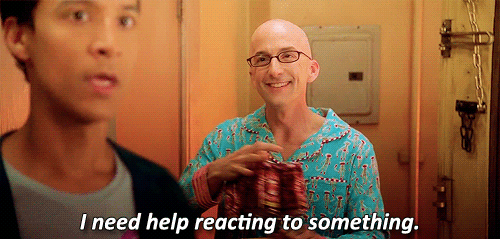For those of you playing along at home, it’s been a little over two weeks since I began the switch from 225mg/daily Effexor XR to 50mg/daily Zoloft. While it’s too early to claim a victory, the early results since beginning Zoloft have been very promising.
I will reiterate here that this post is not here to discredit or discourage the use of Effexor XR. Nor is it here to promote Zoloft as ‘better’ or ‘more effective’. How you respond to medication will rely entirely on your body’s ability to produce and use chemicals that affect brain function.
I came to Zoloft after a year and a half on Lovan (which worked for around eighteen months, and stopped) and three years on Effexor XR (which had very little or no noticeable effect on my depression). My research told me that others who responded in the same way to Lovan and Effexor XR had good results with Zoloft–which is hardly good medical science but it’s a better start than picking the next one off a list and seeing how that works. Finding the right medication at the right dose is trial and error at best.
Stepping off Effexor XR (especially from that dose) was one of the most uncomfortable, unpleasant, and downright frustrating experiences I’ve had. I knew it wasn’t going to be good, I’d been avoiding making a switch for that exact reason. At the time where I had tapered down to zero, I could barely function without wanting to scream, cry, or vomit. I watched a lot of Netflix and crawled from lounge to bathroom to avoid the dizziness of being vertical.
And I had meltdowns, but if we’re being perfectly honest–the withdrawal meltdowns were no different to the meltdowns I was having on a full dose. This was just further proof to me that the Effexor XR had not been assisting me in the way it should have.
I went straight onto Zoloft at 50mg. I was expecting more negative mental side effects, I was expecting more mood swings and unpredictability–but that never happened. The pharmacist warned that it could cause dizziness (he was very right about that!) and along with some nasty headaches from my body screaming for Effexor XR, I was in a pretty rough physical state for a week. The dizziness still comes and goes, I’m still adjusting (it’s very early days yet) but I feel I am presently more stable than I have been in perhaps the last three years.
Take, for example, my day trip to the city on Saturday. I went down to sit a test, and because the train services from town are ridiculous on weekends, I would have to arrive at 9.30am and leave at 6.30pm. The test was at 12.30 and only went for an hour. It’s a lot of time to fill when you’ve got very little money to spend.
I went anyway, and I went at the last minute. I’d originally decided I wouldn’t, and would try to secure some work. I was unsuccessful with that. I was tempted still to cancel the appointment and mope at home, conserve money. Or I could go to the city on strict rules to not overspend and attend the test anyway. So I did that.
I told myself I could go to a couple of cheap shops for homewares that I needed (jugs for the fridge, so I can make myself iced tea) that I suspected I would be able to get at a better price than shops here. So I spent the morning at Daiso, and purchased two solid watertight jugs at $2.80 each. Considering the ones here at home were $9+, I was pretty happy with that. I was only allowed to purchase a food item if it was for immediate consumption, substantial, and less than $3. I ate a lot of good sushi rolls.
On the train, the most bizarre (for me) thing happened. When I boarded, I selected a seat across from a girl who had curled up over three seats and was trying to sleep. I planned on doing the exact same thing. A few moments after I sat down, she asked if I could wake her when other people wanted the seats.
This is normally where I would do a small nod, and hope to goodness for no more talking. Instead, I laughed and told her I intended to sleep as well but if I was awake I would have her back. She laughed and we both dozed off on the train. Halfway to the city, where the train fills up very fast, it was her who woke me up so an elderly couple could take the seats beside me. By the time we got to the city, she was asleep. Again, normally I would scoot out of there as fast as I can and avoid further interaction.
Instead, I tapped her on the knee and woke her up so she could exit the train before the conductors had to do it. She woke, and told me about how she was going to adopt a cat while in the city, and we chatted until the train was stopped.
I’ve been feeling extra social and relaxed like that. When I go into town, I don’t hope the people I know don’t see me, I actively walk up to them and start a conversation.
In fact, I’ve been relaxed about a lot of things. Simple things, like not waiting until every visible car is out of sight before I cross the road, and just walking to the shops when it’s starting to get dark rather than obsessing over whether I should or shouldn’t.
I’ve been more energetic, too. Outside of the physical exhaustion, I’m finding the drive to do things I would normally leave for another time. I’ve been cooking. I love cooking when I don’t have to do dishes, so I’m making the most of the dishwasher I have here. Cooking up some chicken tenders no longer feels like too many steps to get food. I just… do it.
I don’t need quite as much time to prepare for a task, either. That may not make sense most, but when I look at a rack of clothing that needs to be put away, I very rarely have the ability to just do it then. If I try, I feel extremely unsettled about it. The other day I went into the laundry and saw the towels on the rack were dry.
So I put what I was doing on hold (this is also crazy hard most of the time) and got the towels down, folded them and put them all away.
That is an unbelievable level of domestic function for me. This generally only occurs in those intense bursts where I DO ALL THE THINGS at once. Those are useful, but entirely unreliable. I’ve been operating at this level for about a whole week now. A whole week straight.
The best part is that I’ve noticed an increased ability to drop a train of thought if I don’t like it. Where a negative thought would once spawn two more negative thoughts, and I would spiral down to a horrible place–I have literally been able to tell myself ‘Yeah, how about we drop that?’ and move on to the next thought. Without having to forcibly distract myself.
That is unheard of for me. Today I got rejected for a job that I do desperately want–something that two weeks ago would have left me in an inconsolable ball of misery and low self-worth. It still stings and I still feel pretty shitty over it, but it is not the sole thought in my mind. It’s just one of many and I’m able to focus on the better ones. I’m hurt, but not imploding.
I’m beginning to feel a freedom from the detrimental obsessive thinking patterns, and it’s wonderful.
There have been less shiny side-effects, yes. My actions aren’t as heavily regulated as they were–which is good, but I’m more likely to do things without preparation so I don’t get as much of a chance to analyse whether it is a good idea or a bad idea.
Like deciding on Saturday afternoon that I might as well just head out to my football team’s fan day, because it was on. That whim was rewarded with free icecream, a drink bottle, pancakes, and the chance to hold the AFL Premiership Cup! Best day! But not something I would have previously decided to attend just because.
So far it’s all worked out good, but I’m aware that I need to be careful I don’t go to the extreme of blind impulsiveness.
I’m also eating a lot. Food tastes better, I think. I want more and more tastes. I want to cook because cooking is fun, and then I get to eat. I’m slowly switching over from soft drink to iced tea, because it’s cheaper and probably marginally healthier. I’m not picking at things obsessively, the benefits (so far) are worth the journey.
It won’t be this shiny and wonderful forever. I’m looking forward to that too, where basic functions aren’t something to marvel over. I’m looking forward to a new normal built around mundane stability.
I really feel that right now, I’m on the right track to get there. And that’s a pretty good feeling.

